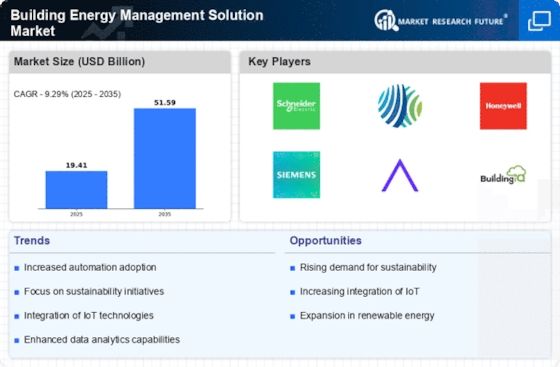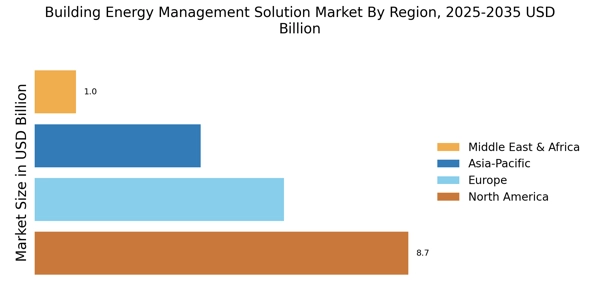Rising Energy Costs
The escalating costs of energy are a primary driver for the Building Energy Management Solution Market. As energy prices continue to rise, organizations are increasingly seeking solutions that can optimize energy consumption and reduce operational expenses. This trend is particularly evident in commercial buildings, where energy expenditures can account for a significant portion of total operating costs. According to recent data, energy costs for commercial buildings have increased by approximately 20% over the past five years. Consequently, businesses are investing in building energy management solutions to enhance efficiency and achieve cost savings, thereby propelling the growth of the Building Energy Management Solution Market.
Technological Advancements
Technological advancements play a pivotal role in shaping the Building Energy Management Solution Market. Innovations in smart building technologies, such as advanced sensors, automation systems, and artificial intelligence, are enhancing the capabilities of energy management solutions. These technologies enable real-time monitoring and control of energy usage, leading to improved efficiency and reduced waste. The integration of IoT devices is particularly noteworthy, as it allows for seamless communication between various building systems. As organizations increasingly recognize the benefits of these technologies, the demand for sophisticated building energy management solutions is expected to rise, driving growth in the Building Energy Management Solution Market.
Enhanced Operational Efficiency
The pursuit of enhanced operational efficiency is a driving force behind the Building Energy Management Solution Market. Organizations are increasingly recognizing that effective energy management can lead to significant improvements in overall operational performance. By implementing building energy management solutions, businesses can streamline their energy usage, reduce waste, and optimize resource allocation. This not only results in cost savings but also improves the overall productivity of the workforce. As companies seek to maximize their operational efficiency, the adoption of energy management solutions is expected to grow, thereby contributing to the expansion of the Building Energy Management Solution Market.
Increased Focus on Sustainability
The growing emphasis on sustainability is a significant driver for the Building Energy Management Solution Market. Organizations are increasingly adopting sustainable practices to reduce their carbon footprint and enhance their corporate social responsibility. This shift is evident in various sectors, including commercial real estate, where sustainability initiatives are becoming a key differentiator. According to industry reports, buildings that implement energy management solutions can reduce energy consumption by up to 30%, contributing to sustainability goals. As businesses strive to align with environmental standards and consumer expectations, the demand for building energy management solutions is likely to surge, further propelling the Building Energy Management Solution Market.
Regulatory Compliance and Standards
The implementation of stringent regulations and standards regarding energy efficiency is a crucial driver for the Building Energy Management Solution Market. Governments and regulatory bodies are increasingly mandating energy efficiency measures to combat climate change and promote sustainability. For instance, many regions have established energy performance standards that require buildings to meet specific energy efficiency benchmarks. This regulatory landscape compels organizations to adopt building energy management solutions to ensure compliance and avoid penalties. The market is projected to grow as businesses strive to meet these evolving regulations, highlighting the importance of energy management in the Building Energy Management Solution Market.

















